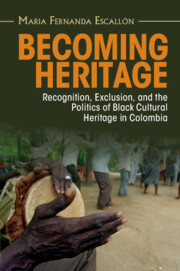Book contents
- Becoming Heritage
- Afro-Latin America
- Becoming Heritage
- Copyright page
- Dedication
- Contents
- Figures
- Preface
- Acknowledgments
- Abbreviations
- Introduction
- 1 A New Framework of Legitimacy
- 2 Institutionalizing Heritage
- 3 Heritage in the Face of Death
- 4 Palenqueras and the Trap of Visibility
- Epilogue
- Bibliography
- Index
2 - Institutionalizing Heritage
Bureaucracy, Meritocracy, and Expertise
Published online by Cambridge University Press: 06 April 2023
- Becoming Heritage
- Afro-Latin America
- Becoming Heritage
- Copyright page
- Dedication
- Contents
- Figures
- Preface
- Acknowledgments
- Abbreviations
- Introduction
- 1 A New Framework of Legitimacy
- 2 Institutionalizing Heritage
- 3 Heritage in the Face of Death
- 4 Palenqueras and the Trap of Visibility
- Epilogue
- Bibliography
- Index
Summary
This chapter traces how Palenque’s heritage declaration, despite being a source of communal pride and collective empowerment, entrenched hierarchical differences that led to conflict between Palenqueros. While the declaration opened new possibilities for additional income and visibility, Palenqueros’ ability to benefit from it varied considerably. Funds intended to support and administer Palenque’s heritage were mediated by bureaucratic channels of disbursement, access to which required technical expertise and political connections. This contest over limited heritage resources drove a wedge between and within groups claiming a right to represent and control Palenque’s heritage. Ultimately, the heritage declaration reinforced hierarchies between Palenque’s leaders as well as between leaders and the community at large.
In this chapter I show how a second, politico-economic type of exclusion materialized. As the heritage declaration manifested in concrete safeguarding projects, public-intellectuals-turned-heritage-entrepreneurs continued to be perceived as better equipped to manage the declaration’s operationalization. Many Palenqueros, including elders and those with no public policy experience, felt they could not compete with local experts who had experience navigating complicated bureaucratic procedures. As the rift between those who practiced ICH and those who managed it grew, heritage management expertise entrenched a form of exclusion between Palenqueros, which in turn delegitimized traditional systems and standards of authority. I explore what I call technocratic capture: how the promotion of Palenque’s ethnic identity has been tied to the elevation of heritage entrepreneurs and their spaces of intellectual and political power.
- Type
- Chapter
- Information
- Becoming HeritageRecognition, Exclusion, and the Politics of Black Cultural Heritage in Colombia, pp. 83 - 117Publisher: Cambridge University PressPrint publication year: 2023

